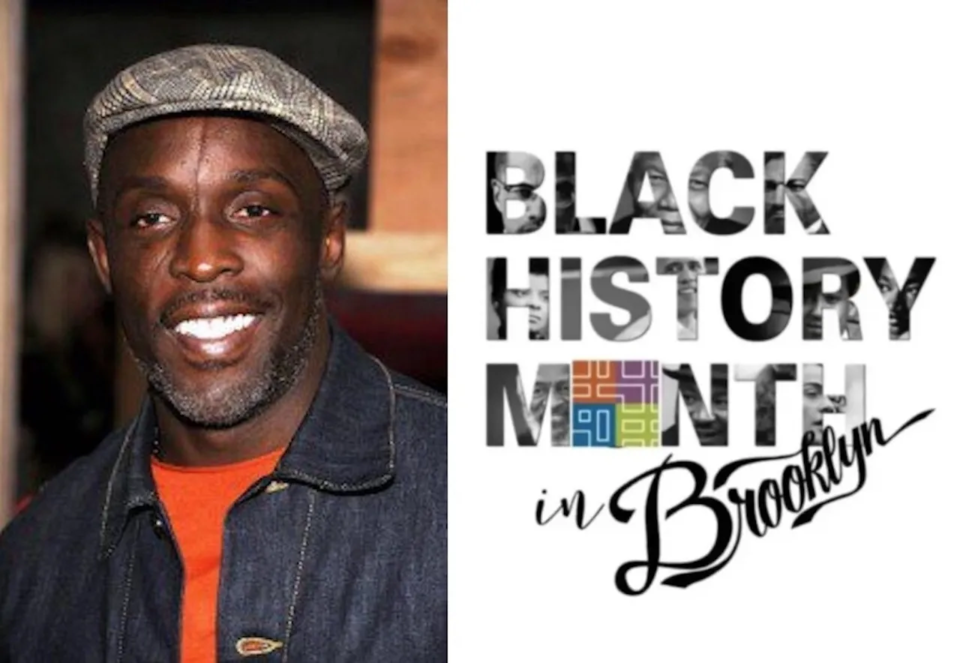Michael Kenneth Williams was born in East Flatbush on November 22, 1966.
Williams grew up in the Vanderveer Estates, raised by his Bahamian mother Paula, a seamstress and day-care center manager, after his father, Booker T. Williams, moved back to the South.
In an interview with Men’s Health, Williams said his father’s departure left with him with a lot of trauma, saying that it wasn’t easy for a Black woman raising a Black boy “in an aggressively violent neighborhood. That was not easy to navigate through alone.”
“But my mom is so stable, so grounded, such a foundation. She created such a foundation for me in the middle of the jungle.”
Williams went to George Westinghouse Career and Technical Education High School — which counts Biggie, Jay-Z and Busta Rhymes as alumni — and, after graduating, he got a job working at Pfizer.
During his time at the pharmaceutical company, Williams saw Janet Jackson’s music video for Rhythm Nation and was inspired to become a dancer. He quit his job and entered the world of entertainment.
During a year in which he was intermittently homeless, Williams visited record labels and dance studios looking for work and found a job as a background dancer with singer Kym Sims. Through that, he was able to appear in videos for musicians including Madonna and George Michael. It was on the set of one of Michael’s videos where Williams realized he could act, saying that night he ““just changed my résumé. I added the word ‘actor’ to ‘model/dancer’ and things started to shift.”
Due to the large facial scar Williams got in a bar fight on his 25th birthday, he says he received a lot of attention for tough roles in film, TV and music videos. It was this look that attracted Tupac, who picked Williams from a polaroid to star in his Williams’ first feature film debut, Bullet.
Williams dove head first into acting and was in several productions of the La MaMA Experimental Theatre, the prestigious National Black Theatre Company and the Theater for a New Generation directed by Mel Williams.
But the role that took his fame to soaring heights was that of Omar Little in The Wire, the police drama set in Baltimore that ran for five seasons on HBO.
Williams, who received the part after just one audition, made Omar one of television’s most memorable and hard-not-to-love characters. Portraying an openly gay Black man, who was also a drug-dealer-robbing murderer — and doing so with a poetic tenderness — was groundbreaking for television at the time (The Wire kicked off in 2002).
Williams was nominated in 2009 for an NAACP Image Award for “Outstanding Supporting Actor in a Drama Series” and was praised by President Barack Obama for his performance. Obama said The Wire was his favorite television show and Omar was his favorite character: “That’s not an endorsement. He’s not my favorite person, but he’s a fascinating character … he’s the toughest, baddest guy on the show.”
After The Wire Williams went on to star in a number of other productions. He played Chalky White in HBO’s critically acclaimed series Boardwalk Empire, and earned five Primetime Emmy Award nominations for his performances in the biopic Bessie the Netflix drama series When They See Us, and the series The Night Of and Lovecraft Country. He also had a recurring role as a high school teacher in Community.
Williams also earned a number of accolades for his acting on the big screen, which included roles in Gone Baby Gone, The Road, 12 Years a Slave, Inherent Vice and Motherless Brooklyn.
He also starred in a number of music videos, including for Young Geezy, R. Kelly, The Game, Cam’Ron, ASAP Rocky, and MGMT.
In 2016, Williams started hosting Black Market, a series on Vice in which he visits various clandestine markets to explore how they operate and the clientele they attract. He also worked with the media company on a show that looked into the root of the American mass incarceration crisis: the juvenile justice system.
But Williams’ work wasn’t just on screen.
The Brooklyn-native was dedicated to giving back to his community and he did so in numerous way. He established Making Kids Win, which provides opportunities to under resourced youth; served as the American Civil Liberties Union celebrity ambassador to the Campaign for Smart Justice; testified at a City Council hearing in 2020 to support NYPD reform; and volunteered at youth group Operation Who Counts.
In the wake of George Floyd’s death, Williams wrote a column that ran in newspapers nationwide to promote the work of anti-violence youth nonprofit, NYC Together. That group, he said, “engages youth and officers to reimagine solutions to community problems, lessening the need for traditional law enforcement intervention.”
Throughout his career, Williams struggled with drug addiction, something he openly talked about. Tragically, in September 2021, Williams died prematurely of an overdose at age 54 in his Williamsburg apartment. In 2022, four men were charged with selling Williams heroin laced with fentanyl.
He is survived by a son, Elijah.
During his time on screen, Williams became one of the country’s most prominent actors and was described as a “singular presence, onscreen and off, who made every role his own.” He had the unique ability to bring complicated characters to life in the most touching way, and he established himself as a talented, versatile performer who captivated audiences with his storytelling.
Michael K. Williams, we are in awe of your talent on screen and your contributions off it. You are a man of the people and a son of Brooklyn and we are proud of those roots! We want to thank you for your contributions to our borough!




